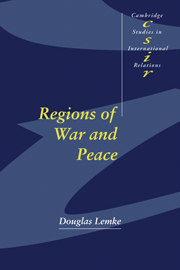Book contents
- Frontmatter
- Contents
- Acknowledgments
- 1 Introduction
- 2 Theoretical origins
- 3 Theoretical revision: the multiple hierarchy model
- 4 Identifying local hierarchies and measuring key variables
- 5 Empirical investigations
- 6 Further investigations I: great power interference?
- 7 Further investigations II: an African (interstate) Peace?
- 8 Conclusions, implications and directions for continued research
- Appendix: Replication with Correlates of War capabilities data
- References
- Index
- CAMBRIDGE STUDIES IN INTERNATIONAL RELATIONS
6 - Further investigations I: great power interference?
Published online by Cambridge University Press: 22 September 2009
- Frontmatter
- Contents
- Acknowledgments
- 1 Introduction
- 2 Theoretical origins
- 3 Theoretical revision: the multiple hierarchy model
- 4 Identifying local hierarchies and measuring key variables
- 5 Empirical investigations
- 6 Further investigations I: great power interference?
- 7 Further investigations II: an African (interstate) Peace?
- 8 Conclusions, implications and directions for continued research
- Appendix: Replication with Correlates of War capabilities data
- References
- Index
- CAMBRIDGE STUDIES IN INTERNATIONAL RELATIONS
Summary
Perhaps the most obvious criticism of the results reported in chapter 5 is they are based on analyses of a dataset which includes neither cases nor variables representing great power interference in minor power interactions. This may be especially egregious in some situations. For instance, it is hard to think of the outbreak of various Arab–Israeli wars without consideration of American and Soviet activity in providing weapons, intelligence, etc. At the same time, it is not hard to imagine that Israel and Egypt were at parity, one of them dissatisfied with the local status quo, and both itching to go to war with the other in, say, 1965. However, escalation in Vietnam might have drawn American strategic attention away from the Middle East, and thus the Americans might have pressured the Israelis into avoiding war at that point in time.
In these hypothetical cases the actions of external great powers affect whether minor powers wage war. In the first case superpower activity makes war more likely, while in the second it makes it less likely. In both cases the activity of one or both superpowers might have been an important causal factor in whether war occurred. In none of the analyses in chapter 5 is such activity represented in any way. Consequently, if external great power activity is systematically related to the occurrence of minor power war, the analyses in chapter 5 are potentially contaminated by omitted variable bias. Omitting variables does not mean I believe they have no effect.
- Type
- Chapter
- Information
- Regions of War and Peace , pp. 146 - 160Publisher: Cambridge University PressPrint publication year: 2002



